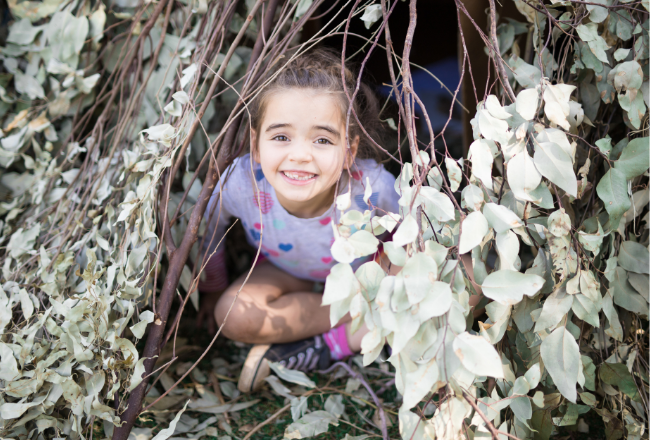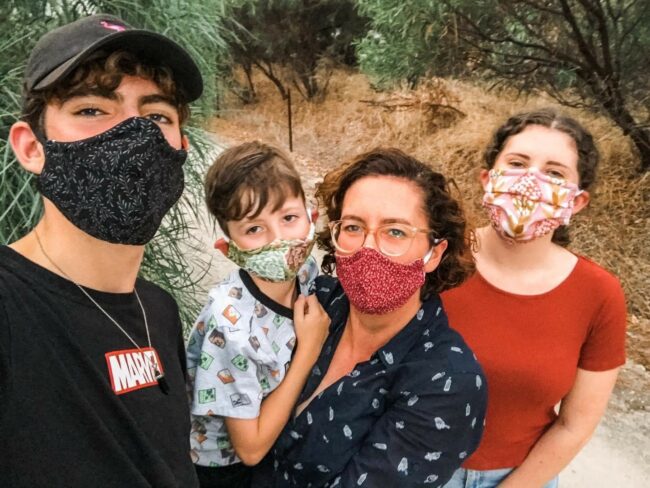While children (and parents!) may find the new mask rules for children challenging, Nature Play WA has some tips on supporting your child in wearing a mask, and how to help them decompress and wind down when the day at school is over, and the mask comes off.
With Western Australia moving to Level 2 public health measures on Thursday March 3, children in Years 3-6 will now be required to wear a mask in all public indoor settings, which means there will be a lot of children heading to school today in masks for the very first time, including my 9-year-old son.
While he’s worn a mask in the early days of the pandemic (to be like his older siblings) and has had a few practise runs this year in preparation of the mask rules we thought would (and now have) come in for younger children, the results have been hit and miss. On some occasions he’s happy to wear one, as he feels he’s helping keep himself and his friends safer, and other times he gets frustrated because his mask is itchy on his nose, and he needs remove it whenever he wants a drink. So, swings and roundabouts.
While parents may be concerned about how mask-wearing will impact the mental health and wellbeing of their children, research suggests that while there has been an increase in anxiety and stress in children due to the COVID-19 pandemic, the wearing of masks does not necessarily cause anxiety or stress but may alleviate concerns children have about contracting the disease.
Similarly, with masks allowing children to stay in their regular school environment, their wellbeing is supported by allowing them to take part in everyday “normal” activities, rather than the disruptive effect of school closures and lockdowns, and missing social time with their friends.
Children may find wearing a mask allows them to feel as though they have some control during this confusing and challenging time, and that they are helping to keep themselves and their friends safe. Other children, particularly those with sensory issues, may find wearing masks a struggle.
Raising Children Australia has some excellent information on how to talk to children about wearing face masks, explaining the importance of them, and how to tune in to your child’s feelings about wearing a mask. For children with sensory issues The Chaos and the Clutter provides tips and information for supporting mask wearing.
While masks are now required for students Year 3 and up while they are indoors, there are opportunities for teachers to allow their students time without masks if they are teaching outdoors. With physical distancing measures in place, learning can be taken outside the classroom, to give children an opportunity to take a break from masks.
We have some wonderful teaching resources and lesson plans mapped to WA curriculum on our website and at Outdoor Classroom Day Australia to support everyday learning outside the classroom.
Nature Play WA Resources
Outdoor Classroom Day Australia Resources
You may see some changes in your child’s demeanour as a result of the new requirements, including tiredness (even more than from a regular day at school) and irritability, which then diminishes their ability to manage even slightly frustrating or challenging situations. This means you may be on the receiving end of tears of frustration, or shouts of anger, as your child works to process these feelings.
When you’re faced with overtired grouchiness or full-on meltdowns, I would ask you to be kind to yourself, to recognise you’re doing your best, and to look for opportunities to have fun and spend time together as a family, without masks.
Get Out!
While you don’t need to wear masks in your own home, just being inside after spending the day in class wearing a mask may be too much of a trial for some children. While you may usually come home from school or after-school care and get stuck into homework or relax indoors, why not take it outside? You don’t even need to move beyond the verandah or your backyard fence line. The air on your face after a day in a mask is really refreshing, and even a brief time outside will have a remarkably restorative effect.
Dine Out
I’m not suggesting a fancy restaurant on a school night, but something much simpler, right outside your back door. Why not mix things up by having dinner outdoors, either with a barbecue (throw a few snags on the barbie) or taking dinner straight from the oven into the great outdoors! There are very few meals that are not improved when eaten as a picnic. If dinner outside is too challenging, why not take dessert, or even a Milo and a biscuit outdoors after the main course is eaten.
Walk It Out
With the evenings still holding onto the daylight until close to 7pm, going for a walk around the block (or even further afield) gives your child the chance to stretch their legs, and feel the breeze on their bare face. Also, walking side-by-side brings an opportunity to for conversation in a less challenging way than face-to-face over the dinner table. Being physically active also gives a “distraction” that allows children (particularly ones who may not be so forthcoming with their thoughts and feelings) to bring up subjects that are of interest or concern to them.
Weekend Outside
With two days at school in masks before the Labour Day long weekend, the three-day break is a good opportunity to spend as much time as possible outdoors, before a return to masks on Tuesday.
Nature Play WA has many resources to support families to get outdoors, including:
And free downloadable resources for fun nature-based activities!
But you don’t even have to “go” somewhere and “do” something. You don’t need to plan a grand expedition, with multiple locations to visit and a plethora of activities to take part in (unless that’s something that floats your boat).
Have a wander around your neighbourhood and notice changes in the trees along your street. Venture to your local park for a gentle kick of the footy or throw of the frisbee. Meander down to a nearby creek or lake to make mini boats from fallen leaves and have a race (a different way to float your boat).
For my family, we’ll be wandering down to the neighbourhood lake to see how many birds we recognise, taking a walk in our local bushland to see which trees are flowering and how many rabbit holes we can spot, and heading to our favourite beach for an ice cream followed by a body surf/swim/soak/splash. We might even fire up the barbie for an impromptu sausage sizzle.
There are so many ways to find time in nature, and in challenging and uncertain times like these, there’s never been a better reason to do so.
More COVID-19 support resources for children and families:
Telethon Kids Institute – COVID-19 Resource Hub


